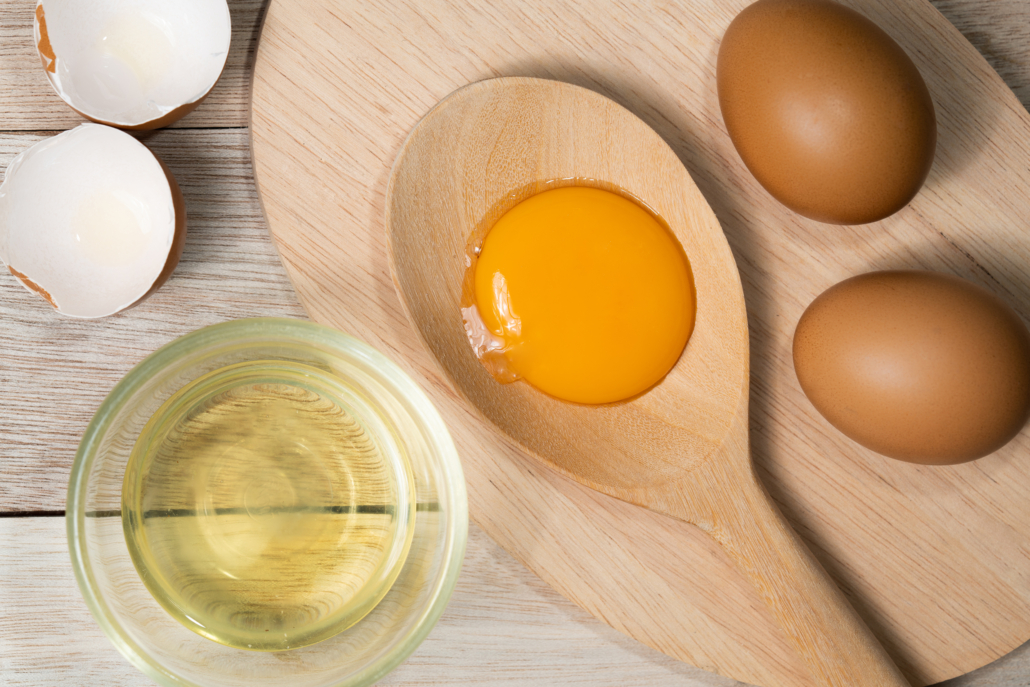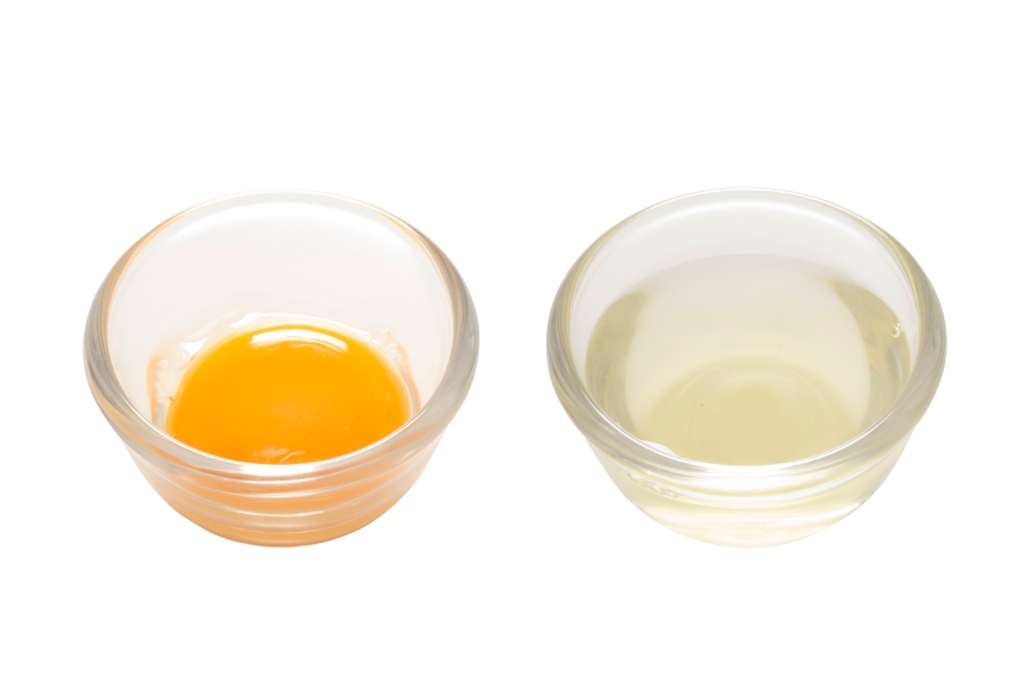We include products in articles we think are useful for our readers. If you buy products or services through links on our website, we may earn a small commission.
Egg Yolk Nutrition and Benefits

Egg yolks are the radiant, nutrient-packed heart of the humble chicken egg, yet they’ve long been subjected to nutritional fearmongering. While egg whites have gained popularity during the anti-cholesterol mania since the 1960s, the record is finally being corrected by modern nutrition science: The egg yolk provides a treasure trove of essential nutrients and unique compounds that contribute to numerous health benefits.
In this article, we’ll explore the nutrition and benefits of egg yolks, from their essential vitamins and minerals to heart-healthy fatty acids. We’ll look at the latest research in order to address some common misconceptions surrounding egg yolk nutrition.
Table of Contents
Why You Should Not Worry About the Cholesterol in Egg Yolks
Many people fear egg yolks because they are high in cholesterol. The yolk of one egg provides 184.5mg of cholesterol.7
In 1968, the American Heart Association supported a now-debunked link between dietary cholesterol intake from eggs, high blood cholesterol, and increased risk for cardiovascular disease.
This link was based on faulty epidemiological observations (not randomized control trials). At the time, the American Heart Association received significant funding from Proctor & Gamble, which used the AHA guidelines to build a market for their industrial seed oil products, including Crisco. 7
High-quality modern studies have found that eating whole eggs (including their yolk) typically leads to levels of (bad) LDL cholesterol staying the same or undergoing only a slight increase, while (good) HDL typically increases. 14 16
Numerous other studies have found that consuming 1-2 whole eggs per day does not adversely affect cholesterol levels or increase heart disease risk factors. 8 9 10 11
It’s also worth noting that the body regulates how much cholesterol is in the blood and that cholesterol is ultimately an essential and healthy compound. It acts as a building block for vitamin D, and numerous hormones. It is an essential part of bile salt–the substance that your body uses to digest and absorb essential fat-soluble vitamins A, D, E, and vitamin K2. [10]
Not only is cholesterol critical for numerous bodily functions, but many modern studies have also linked high cholesterol with lower risk for specific and all-cause mortality and lower cholesterol with increased risk for all-cause mortality. [14] [15] [16] [17] [18] [19] [20] [21] [22] [23] [24] [25] [26] 9
In fact, the cholesterol in eggs in combination with their bevy of nutrients, may be a contributing factor to the finding of the above study from 2004-2008. Researchers looking at data from .5 million Chinese adults found that people who consumed eggs daily had [5] :
- 14% lower risk of major cardiac events
- 11% lower risk of CVD
- 12% lower risk of ischemic heart disease
- 18% lower risk of CVD death
Now, let’s take a closer look at the specific concentrations of nutrients in egg yolks.
Egg Yolk Nutrition
Egg yolk nutrition tells a story of remarkable nutrient density, including numerous had to get vitamins and minerals. This makes sense when considering that eggs need to provide all the nutrient building blocks necessary to produce a living animal.
| Nutrient Values Per 2 Egg Yolks | Per 34 grams | %RDV |
| Calories | 109 | |
| Fat | 9g | |
| Saturated Fat | 3.2g | |
| Protein | 5.4g | |
| Cholesterol | 184.5mg | |
| VITAMINS | ||
| Vitamin A | 129.5mcg | 14% |
| Thiamin (B1) | 0.06mg | 5% |
| Riboflavin (B2) | 0.18mg | 14% |
| Vitamin B5 (PA) | 1mg | 20% |
| Vitamin B6 | 0.12mg | 7% |
| Folate (B9) | 49.6mcg | 12% |
| Choline | 278.9mg | 51% |
| Vitamin B12 | 0.66mcg | 28% |
| Lutein & Zeaxanthin | 372mcg | |
| Vitamin E | 0.88mg | 6% |
| Vitamin D | Conventional: 1.8mcg Enriched feed: 50mcg | 9%-250% |
| MINERALS | ||
| Calcium | 43.9 | 3% |
| Iron, Fe | .93mg | 5% |
| Phosphorus, P | 132.6mg | 11% |
| Zinc, Zn | 0.78mg | 7% |
| Copper, Cu | 0.03mg | 3% |
| Selenium, Se | 19mcg | 35% |
Antioxidant Protection For Eye, Tissue, and Artery Health
Egg yolk is an excellent source of Lutein and zeaxanthin.
These carotenoids act as powerful antioxidants that have been shown to protect eyes from macular degeneration and cataracts, and they protect against damage caused by ultraviolet rays in sunlight. 6 77
In addition to protecting eye health, lutein and zeaxanthin protect protein, fats, and DNA from various other oxidant stressors. At the same time, they support the recycling process of “master antioxidant” glutathione.1
These antioxidant effects may also protect against “bad” LDL cholesterol, resulting in less plaque accumulation in arteries.1 4 5 6
Supports Intestinal Health
One 2010 study found that egg yolk proteins may increase antioxidant synthesis that specifically protects the intestines from oxidative stress.114
Healthy intestines are crucial for overall health. When the intestinal walls are damaged by chronic intake of inflammatory foods and compounds, including many plant toxins, intestinal permeability AKA leaky gut, can ensue. Once the intestinal walls are compromised, various pathogens can enter the bloodstream by which they are deposited throughout the body, leading to systemic inflammation. 6 7
Supports Brain Health
One of the most potent egg yolk benefits derives from the effects of a nutrient called choline on brain health
Egg yolks are nature’s richest source of choline, contributing 680 milligrams per 100 grams of yolk, or 116% RDV.
Some of the brain-specific benefits of choline in egg yolks include
- Production of important mood-boosting neurotransmitters, including dopamine and serotonin 4 5
- improved memory and cognitive function 4 5
- Supports fetal brain development and reduces the risk of neural tube defects in infants when consumed during pregnancy 13
Selenium
Egg yolks provide an abundance of an incredibly important mineral called selenium.
Selenium is a crucial component of various enzymes and proteins called selenoproteins that factor in vital bodily functions, including [1][2][4][5 6]:
- Proper thyroid function
- Proper immune function, including the ability to fight infection
- Protection against oxidative stress
- reproductive health
- Increases glutathione–a potent antioxidant [3]
- Anti-cancer properties
- Neuroprotective properties
- Supports lung health
Protein in Egg Yolk
Most people don’t realize that there is an abundance of protein in the egg yolk itself, not just the whites.
The protein in egg yolk comprises all nine essential amino acids. Here’s a rundown of the quantities of each amino acid per 4 egg yolks (68 grams) :
| Histidine | 283mg | 40% |
| Isoleucine | 589mg | 42% |
| Leucine | 951mg | 35% |
| Lysine | 828mg | 39% |
| Methionine | 257mg | 35% |
| Phenylalanine | 463mg | 53% |
| Threonine | 467mg | 44% |
| Tryptophan | 120mg | 43% |
| Valine | 645mg | 35% |
In addition to these essential amino acids, the protein in egg yolk comprises a number of “conditionally essential” amino acids. Our bodies can synthesize these amino acids from other proteins in food, but getting these specific amino acids from food skips this process, delivering an abundance of specialized amino acids. One such conditional amino acid that is gaining attention is tyrosine.
The tyrosine in egg yolks is used by your body to create brain-signaling molecules called neurotransmitters. These molecules include
- Dopamine: a chemical released in the brain that produces positive feelings, drive, and motivation
- Norepinephrine (noradrenaline): A neurotransmitter and hormone that factors in the “fight-or-flight” response to perceived threats
- Epinephrine: AKA adrenaline, factors in fight-or-flight responses and athletic activities
Four egg yolks provide 461mg, or 53% of your RDV of tyrosine.
Tryptophan
Egg yolks are a great source of an amino acid called L-tryptophan, with 42% per only four egg yolks.
Your body uses L-tryptophan to make various proteins, hormones, and neurotransmitters proteins, including melatonin and serotonin.7 8 9
Melatonin helps regulate the sleep-wake cycle, supporting healthy sleep patterns. Serotonin regulates appetite, sleep, mood, and pain. 6
Groups that Egg Yolks May Not be Good For?
Egg yolks are a remarkably healthy food for most people. However, consuming foods high in cholesterol may not be appropriate for people who have a genetic condition known as hypercholesterolemia.
Hypercholesterolemia is characterized by chronically high cholesterol levels and high risk for cardiovascular disease. These issues can be exacerbated by consuming high-cholesterol foods. 32
Egg Yolk Nutrition and Benefits: The Bottom Line
Egg yolks are a nutritional powerhouse that should never be shoved aside and replaced with just the whites.
Previously vilified for their cholesterol content, modern research tells a story of unfounded fears and various powerful health benefits.
Egg yolks are a robust source of essential nutrients such as vitamins, minerals, and antioxidants. Nutrients like choline, selenium, L-tryptophan, and lutein and zeaxanthin support numerous physiological functions, from regulating mood and sleep, to improving memory and brain health, to protecting your eyes from age-related degradation.
Contrary to popular belief, for most people, the cholesterol in egg yolks doesn’t significantly impact blood cholesterol levels. In fact, research shows that egg yolk can actually support heart health.
Moreover, egg yolks are versatile and delicious, making them a convenient, natural “multi-vitamin” that can be added to various meals. Bon appetite!














